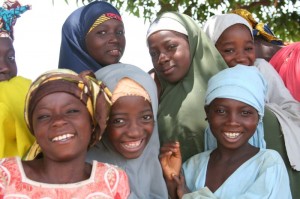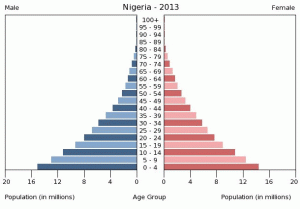Time to Get Serious About Investing in Youth
May 22nd, 2014 | By admin | Category: Youth RightsBy Suzanne York, www.howmany.org
There has been much news lately on the 270 Nigerian schoolgirls kidnapped last month by the terrorist organization Boko Haram. It took some time to hit the airwaves, and it partly took a Twitter campaign that began in Nigeria to make the headlines. Once it did, advocates from Michele Obama to Jane Goodall worked to raise awareness of the girls’ plight and spur action with the hashtag campaign #BringBackOurGirls.
Slowly, action is being taken, with the U.S. sending in 80 troops to search for the abducted girls.
To prevent future kidnappings, Nigeria and the global community need to invest in people and recognize basic human rights to education, healthcare and livelihoods, especially for youth. This is critical, not just because of the kidnapping, but for global security: youth without education or jobs have little hope.
Boko Haram, loosely translated from the local Hausa language, means “Western education is sin,” for its rejection of Western concepts such as evolution and the big bang theories. The extremist group has stepped up its campaign against Western education, which it believes corrupts the moral values of Muslims – especially girls.It’s Not a Black and White Issue
Nigeria is the most populated country in Africa, with 174 million people, and is projected to have 440 million by 2050, which would make it the third most populous in the world. The total fertility rate (the average number of children born to a woman during her lifetime) per woman is 6.0. It is a country rich with natural resources, much of it oil. Despite the potential for a strong economy, Nigeria is faced with chronic poverty, human rights abuses, corruption, uneducated youth, gender disparities, religious conflicts, and of course, terrorist organizations.
The Nigerian kidnapping underscores the connection between lack of education, rapid population growth, unemployment and insecurity. Nicholas Kristof of The New York Times recently wrote that “One study found that for every 1 percentage point increase in the share of the population aged 15 to 24, the risk of civil war increases by 4 percent.”
Alan Weisman, author of Countdown, noted that over half the world’s population of 7.2 billion are under 27 years of age, and over half of those are males. Many of these young men are unemployed, leaving them ripe to be recruited by nefarious organizations. The 9/11 Commission Report warned back in 2004 that “a large, steadily increasing population of young men [is] a sure prescription for social turbulence.”
In Nigeria, 44 percent of the population is under the age of 15. So along with educating girls and boys it is essential to create sustainable livelihoods to keep them employed and out of poverty.
Girls Education: The Low Hanging FruitThe reason to invest in education is to improve future opportunities for youth. The Central Asia Institute (CAI), which empowers communities of Central Asia through literacy and education, especially for girls, lists the following reasons why educating girls is so important:
- reduces infant mortality
- reduces maternal mortality
- improves socioeconomic growth
- reduces the prevalence of child marriage
- reduces overpopulation
- improves nutrition
- increases political involvement
- reduces domestic and sexual violence
- increases the overall number of educated children
- reduces support for militancy (emphasis added)
CAI should know about instability, as it works in Pakistan and Afghanistan, with high levels of militant activity. From Nigeria to Pakistan to Congo, education and empowerment are the keys to a better future.
To quote Kristof again, “Some two-thirds of women in the region have had no formal education. Only 1 in 20 has completed high school. Half are married by age 15.”
Investing in the Future
In a nutshell, the focus – along with international development and investment – must be broadened to include education, empowerment, healthcare, jobs, democracy, transparency, and gender equality in order to overcome the Boko Harams of the world and make communities safe for all citizens.
It is in the world’s interest to help make this happen in every country.
Suzanne York is a senior writer with the Institute for Population Studies.


